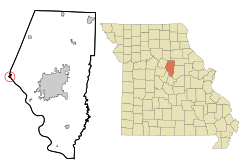Rocheport, Missouri
| Rocheport, Missouri | |
|---|---|
| City | |
 Location of Rocheport, Missouri |
|
| Coordinates: 38°58′46″N 92°33′44″W / 38.97944°N 92.56222°WCoordinates: 38°58′46″N 92°33′44″W / 38.97944°N 92.56222°W | |
| Country | United States |
| State | Missouri |
| County | Boone |
| Area | |
| • Total | 0.27 sq mi (0.70 km2) |
| • Land | 0.27 sq mi (0.70 km2) |
| • Water | 0 sq mi (0 km2) |
| Elevation | 614 ft (187 m) |
| Population (2010) | |
| • Total | 239 |
| • Estimate (2012) | 243 |
| • Density | 885.2/sq mi (341.8/km2) |
| Time zone | Central (CST) (UTC-6) |
| • Summer (DST) | CDT (UTC-5) |
| ZIP code | 65279 |
| Area code(s) | 573 |
| FIPS code | 29-62498 |
| GNIS feature ID | 0725426 |
Rocheport is a city in Boone County, Missouri, United States. It is part of the Columbia, Missouri Metropolitan Statistical Area. The population was 239 at the 2010 census. Rocheport includes the Rocheport Historic District, an area with buildings dating from 1830 and which is listed on the National Register of Historic Places.
Rocheport was a trading post for both settlers and Native Americans. After the purchase of the Louisiana Territory in 1803, President Thomas Jefferson commissioned Meriwether Lewis and William Clark to lead an expedition to explore the western territories. On June 7, 1804, their journey lead them to the convergence of the Missouri River and Moniteau Creek near the future settlement of Rocheport. Clark noted the features of the land, flora, fauna and native pictographs on the bluffs in his journal. The Sauk leader Quashquame led a village of Sauk, Meskwaki, and Ioway near Rocheport along Moniteau Creek in the first decade of the 19th century; this village was noted by Zebulon Pike in 1806. Rocheport became a permanent settlement in the early nineteenth century. Rocheport is a French name meaning "rocky port".
The Moses U. Payne House is a historic structured located just outside Rocheport.
...
Wikipedia
